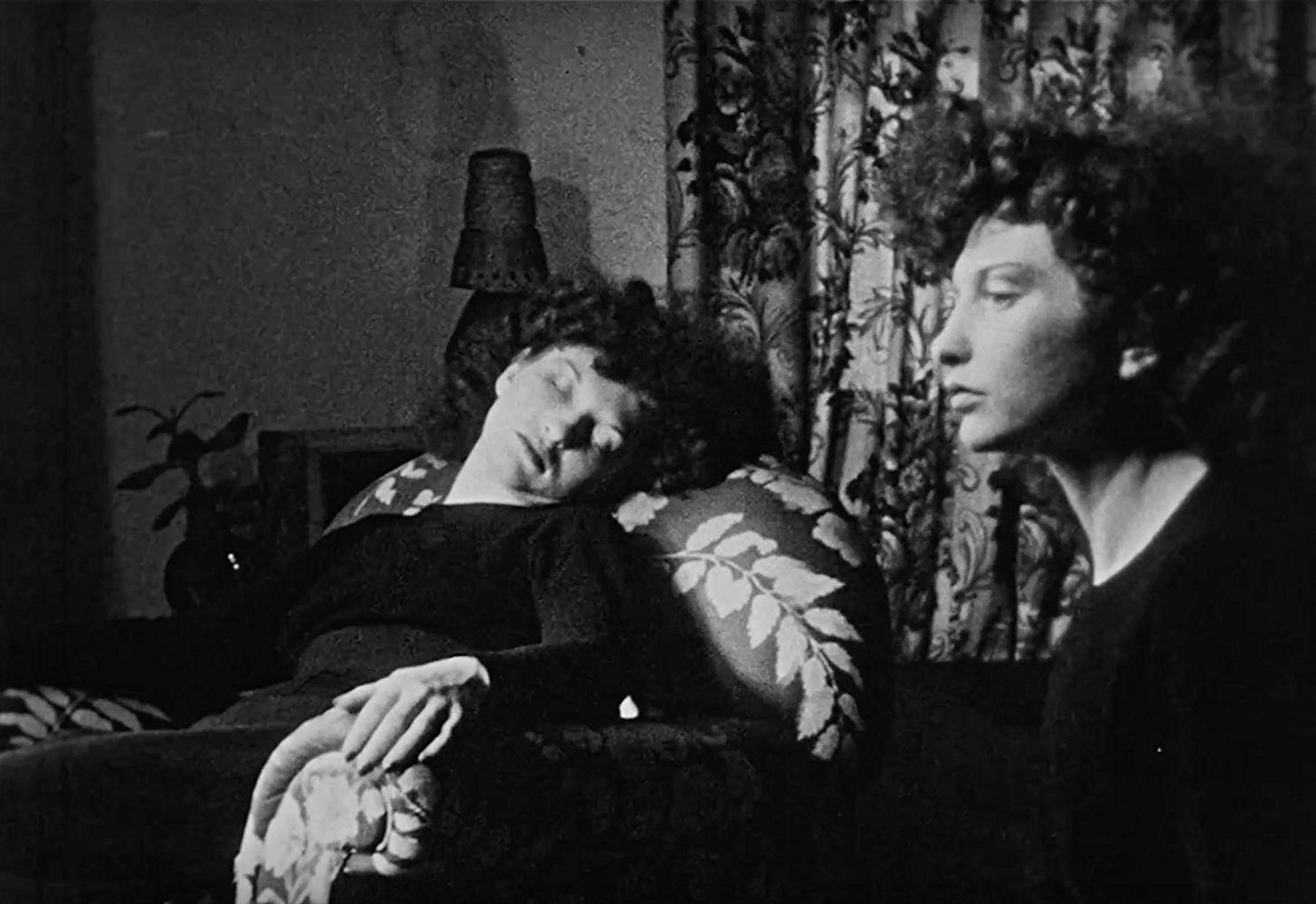Seats were all but filled at turns during Women and the Movies They Make, a series of two programs sponsored by Dallas VideoFest and assembled by UTD film professor Shilyh Warren. Those who stayed until the end were well-rewarded with emotional exhaustion. Stories of love, death, self-hate and societal pressure disregarded expectations for what a film should look like and how far it should go in telling a personal truth. The selections were all from the decidedly non-commercial Women Make Movies catalog.
Warren started at the beginning. That’s an uncomfortable place to start, when it comes to the history of cinema. The first selection of an introductory program she called “Women’s Work” led with the documentary Women Who Made the Movies. Released in 1992, the archival journey is a straightforward— and culturally reductive— survey of overlooked women filmmakers from the early days of cinema, compiled by historians.
“I want us to get an idea of how big and expansive the idea of women’s filmmaking is,” Warren said from an aisle near the front of the theater.
The doc was immediately urgent to rescue as many names from relative obscurity as possible. True champions got their due, like Alice Guy-Blaché, who’s considered by many to be the first person to deliberately make a narrative film and demand natural performances from actors. Experimental filmmakers daring by today’s standards like Germaine Dulac appeared alongside Hollywood brass. She directed an unprecedented piece of visual music in 1928 with The Seashell and the Clergyman. A British censor banned it. “If this film has a meaning, it is doubtless objectionable,” was the official statement.
There was little time for contextual criticism, even in passing. For example, nothing was said about the white actors who play Japanese characters in Lois Weber‘s 1912 drama A Japanese Idyll. Of a time, sure. (Of our time, too.) But it wasn’t mentioned in the film; it seemed that would muddle the air of congratulations in recognizing these directors for having hard-won careers and developing their talents in a male-dominated industry. We learn how enthusiastic Nazi propagandist and filmmaker Leni Riefenstahl earned Frank Capra’s favor. Her work in the service of Hitler is deemed “controversial.”
Women make problematic films too, Warren noted later. The documentary was simply meant to name women directors who were so seldom named, she explained. Recognition and celebration often seem too similar in these surveys when there’s a total absence of critical perspective. To say women directors earned the right to make racist statements just like their male colleagues, for example, would be an absurd way to define progress in any discipline.
The documentary kept the viewer hungry to watch and name the many facets of films made by women and wrestle with them. Warren’s later selections would facilitate cultural education through first-person narratives, and she was eager to show them.
After Maya Deren’s landmark 1943 experiment Meshes of the Afternoon (Fandor has it) and an ambiguously painted portrait of a domestic worker called Fannie’s Film (1979), the audience was entranced by a rare street harassment PSA that outdoes any I’ve ever seen. It was conceived, essay style, by Women Make Movies co-founder Sheila Page and released in 1977. A Street Harassment Film is 11 minutes of pure triumph. After recognizable and claustrophobic scenes of women being verbally accosted or cornered on the street, a self-defense class takes over the screen. An instructor urges women to note how hard the bones in their elbows are, to feel those elbows when insecurity strikes. She asks them to press the tender spot just under their own noses. Hurts, right? She is centered and almost comical in her delivery. The subtext is that women are human, able to feel and inflict pain. They reunite with their own bodies. There’s a chorus of screaming as the women run through their drills.
The class participants then show up at a party costumed alike in cocktail dresses. Following a kind of dream logic, they flirt audaciously with men, sprawl out against bannisters with ease. One reaches over to a man in a suit whose penis is exposed and grabs it— a contextual move, meant to reference the easy access to women’s bodies that men have historically assumed. It’s hilarious and weird and ends with a long pan of women sitting together, various races and ages represented, as Nina Simone’s “I Wish I Knew How It Would Feel To Be Free” plays for longer than one expects. They’re all believably smiling. The point— the warmth of their existence— is made and felt.
Jane Campion’s first film Peel was next, a last-minute fill-in due to a technical difficulty. Campion is probably best known for her 1993 erotic drama The Piano. Warren acknowledged how this glimpse at her early work, a rhythmic ode to stubborn redheads, is relatable to any mother who’s been on a road trip. Peel is delightfully scrappy in tone and available for stream on Filmstruck.
The next phase of the program called “Feminist Visions” brought nine shorts together from different parts of the world to represent a range of traditions— or, anti-traditions— in personal storytelling. You can view the entire lineup here. I’m going to focus on the three, in particular, whose subjects and delivery lingered after I left the theater.
Coffee Colored Children (1988) was tough to sit through. Ngozi Onwurah tells a story of confusion and deep inner turmoil using visual repetition and powerful first-person narration. As children she and her brother, who have a white mother and a black father, endured constant bullying for their skin color in an all-white England neighborhood. Ngozi references often the hurt of explaining to classmates that her mom was indeed her mom. We see young Ngozi spin in circles wearing a white, gauzy dress. She powders her skin, desperate to turn it white. Her brother is depicted in the bathtub trying to scrub the black out of his skin. As their bodies grow, these images persist. Finally, in a gorgeous scene at the end, she and her brother are shown outdoors bathing in clear water. The film is a potent personal history which offers crucial insight into the way racism fractures children, who become adults in need of healing.
Measures of Distance (1988) raises the question: what qualifies as a film? All-but-static images of notes on graph paper in Arabic script, obscured by shadows, accompany director Mona Hatoum’s voice as she reads letters her mother wrote to her from Beirut. (Hatoum reads them in English.) The sparse imagery lends the impression of silence and distance. Sometimes the paper is layered gently with pictures the artist took of her mother in the shower. Still, the viewer focuses on Hatoum’s words, which suggest war-torn Lebanon and Palestinian exile just as they show an enviable candor between mother and daughter. You can watch and listen here.
All Water Has a Perfect Memory (2001) by Natalia Almada was the final film in the scheduled program and by far the most memorable. The director was seven months old when her sister Ana Lynn, only two, drowned at their childhood home in Mexico. Almada interviewed her mom, dad, and brother about Ana Lynn’s death. In a beautiful testament to her love for them and the child, Almada pieces together the facts of a loss she can’t remember using their testimonies, photographs, Super-8 home movies, and images of water, inspired by the writings of Toni Morrison about the Mississippi River and memory. When Almada’s father speaks, it’s in Spanish with English subtitles. When her mother speaks, it’s in English with Spanish subtitles. The composition of All Water Has a Perfect Memory captures the impulse of longing to resolve, to bring together. In Almada’s film, water is both an agent of danger and an agent of healing. Below is an excerpt.






